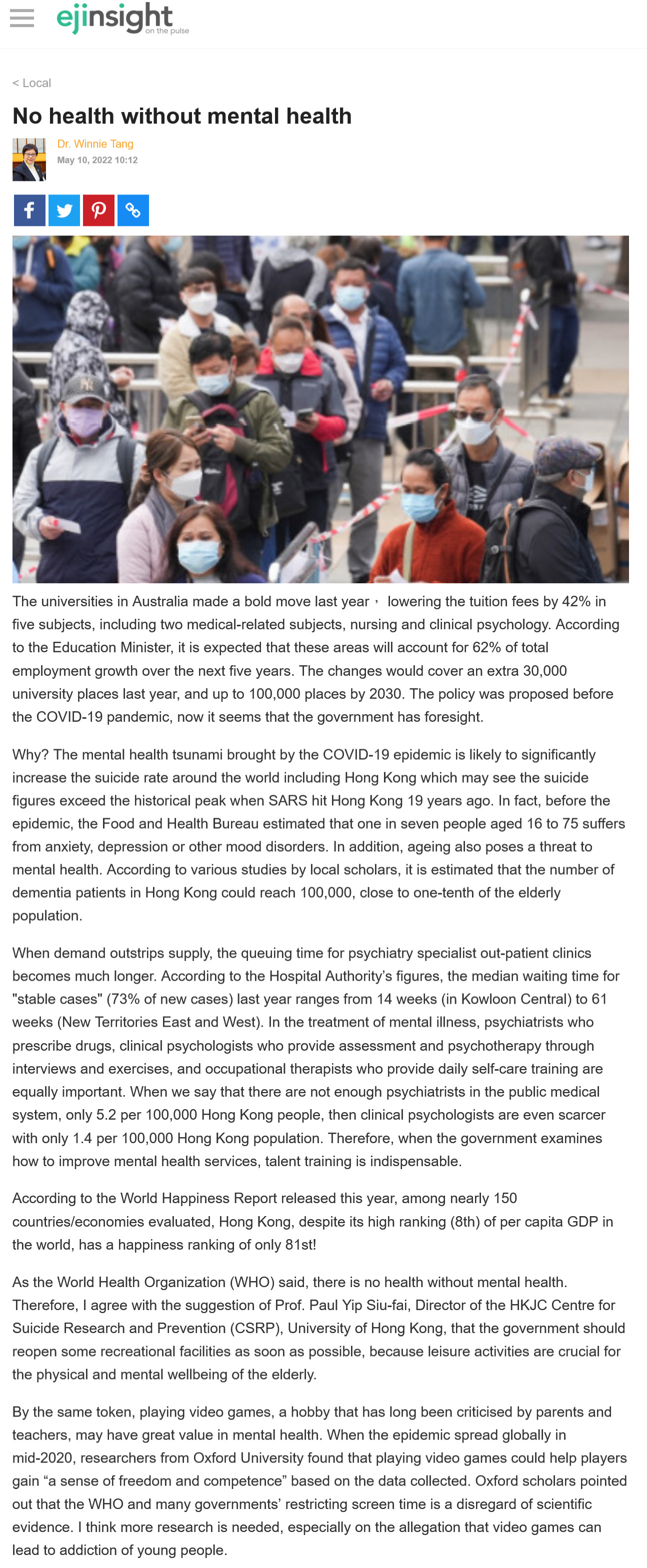網上版請按此

No health without mental health
The universities in Australia made a bold move last year, lowering the tuition fees by 42% in five subjects, including two medical-related subjects, nursing and clinical psychology. According to the Education Minister, it is expected that these areas will account for 62% of total employment growth over the next five years. The changes would cover an extra 30,000 university places last year, and up to 100,000 places by 2030. The policy was proposed before the COVID-19 pandemic, now it seems that the government has foresight.
Why? The mental health tsunami brought by the COVID-19 epidemic is likely to significantly increase the suicide rate around the world including Hong Kong which may see the suicide figures exceed the historical peak when SARS hit Hong Kong 19 years ago. In fact, before the epidemic, the Food and Health Bureau estimated that one in seven people aged 16 to 75 suffers from anxiety, depression or other mood disorders. In addition, ageing also poses a threat to mental health. According to various studies by local scholars, it is estimated that the number of dementia patients in Hong Kong could reach 100,000, close to one-tenth of the elderly population.
When demand outstrips supply, the queuing time for psychiatry specialist out-patient clinics becomes much longer. According to the Hospital Authority's figures, the median waiting time for "stable cases" (73% of new cases) last year ranges from 14 weeks (in Kowloon Central) to 61 weeks (New Territories East and West). In the treatment of mental illness, psychiatrists who prescribe drugs, clinical psychologists who provide assessment and psychotherapy through interviews and exercises, and occupational therapists who provide daily self-care training are equally important. When we say that there are not enough psychiatrists in the public medical system, only 5.2 per 100,000 Hong Kong people, then clinical psychologists are even scarcer with only 1.4 per 100,000 Hong Kong population. Therefore, when the government examines how to improve mental health services, talent training is indispensable.
According to the World Happiness Report released this year, among nearly 150 countries/economies evaluated, Hong Kong, despite its high ranking (8th) of per capita GDP in the world, has a happiness ranking of only 81st!
As the World Health Organization (WHO) said, there is no health without mental health. Therefore, I agree with the suggestion of Prof. Paul Yip Siu-fai, Director of the HKJC Centre for Suicide Research and Prevention (CSRP), University of Hong Kong, that the government should reopen some recreational facilities as soon as possible, because leisure activities are crucial for the physical and mental wellbeing of the elderly.
By the same token, playing video games, a hobby that has long been criticised by parents and teachers, may have great value in mental health. When the epidemic spread globally in mid-2020, researchers from Oxford University found that playing video games could help players gain "a sense of freedom and competence" based on the data collected. Oxford scholars pointed out that the WHO and many governments' restricting screen time is a disregard of scientific evidence. I think more research is needed, especially on the allegation that video games can lead to addiction of young people.
Dr. Winnie Tang
Adjunct Professor, Department of Computer Science, Faculty of Engineering; Department of Geography, Faculty of Social Sciences; and Faculty of Architecture, The University of Hong Kong